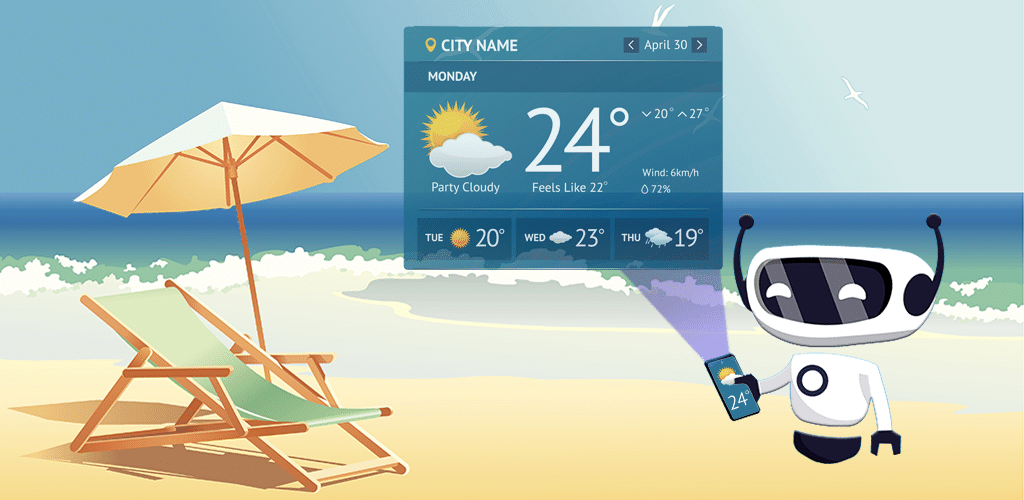November 12, 2019
Privacy Tip of the Week: Stop Using Third-Party Weather Apps
Posted by Rhiannon

- Breaches are common
- They want your location (and more)
- Use first-party apps
- Use a browser
- Avoid the web altogether
- Turn location services off
- Read privacy policies
Breaches are More Common Than You Think
When the City of Los Angeles sued The Weather Channel, this was not the first time a forecasting app had been outed as allegedly misusing customer data. In 2018, the New York Times reported that WeatherBug also collected and sent user data to third-parties. Meanwhile, AccuWeather was caught in 2017 for selling location data even when users had their locations turned off. These examples are far from the only situations in which weather apps have secretly collected and sold user data, and they likely won’t be the last.
Third-Party Weather Apps Want Your Location (and More)
When you first installed a weather app, it probably asked you for access to your location. Most users are only too happy to offer that information; after all, you can’t get an accurate forecast without it. However, because users fork over this information without question, many also don’t question what else the app might use it for. In many cases, third-party weather apps want your geolocation information. This data is highly profitable for outside parties such as advertisers. Your location isn’t the only thing your app wants from you either. In early 2019, a Google Play app, called Weather Forecast — World Weather Accurate Radar, was caught collecting user geolocations, IMEI identification numbers (which act as a serial number of sorts for mobile devices), and email addresses.
Staying Safe: Use First-Party Apps
While many third-party weather apps collect and sell user data, there are also plenty of trustworthy options on the market. The safest ones are typically the first-party apps created specifically by the manufacturers of your device. Google, for example, offers a built-in service for Android devices. Of course, Google itself collects massive amounts of user data but there’s not much you can do to prevent that so using their weather app isn’t going to increase the risk to your privacy. Apple also offers a built-in app which is safer than many third-party options.
Staying Safe: Use a Browser
For users who find themselves paranoid about the use of any weather app, a solid solution is to manually search for the weather in your web browser. While a browser may use cookies, those cookies don’t follow you out of the house like location services on your mobile devices. They’re also easier to delete or prevent altogether with the use of a VPN service.
Staying Safe: Avoid the Web Altogether
Avoiding location tracking and data selling is easiest when avoiding internet-connected devices altogether. Television programs and radio stations are both non-connected options for the weather-wary. These options are, of course, not as convenient as being able to look up the weather at any time, but they are the safest when it comes to privacy.
Staying Safe: Turn Location Services Off
Another helpful but not perfect way to protect your data from third-party weather apps is to turn location services off. Some apps allow you to input your desired location manually while some may require you to enable location data temporarily which can then be turned off later to prevent constant tracking. However, as the 2017 AccuWeather breach accusation highlights, some services may still be able to track you even with location services off.
Staying Safe: Read Privacy Policies
Finally, the best way to keep your data safe from weather apps is to read the privacy policy of the app you want to use. While many apps harvest and sell user data, there are also many that don’t and a privacy policy can help you discern the good from the bad.
The changes of the season bring with them changes in how frequently many people check weather apps. Remember to protect your data as well as you protect yourself from the cold and snow.
To protect yourself further, browse the web privately and safely with HotBot VPN.
]]>Posted by Rhiannon
More Blog Posts
February 14, 2023
How the Investigatory Powers Act Impacts Citizen Privacy
In 2016, the United Kingdom passed the Investigatory Powers Act or IP Act, into law. This act empowered the government and related agencies to access and collect citizen data, without consent. Critics immediately slammed the new law. The media dubbed it the “Snoopers’ Charter.” Meanwhile, Edward Snowden described the act as “the most extreme surveillance […] Read moreFebruary 14, 2023
How to Easily Unblock Wikipedia with HotBot VPN
Wikipedia puts a wealth of information at your fingertips. Everything from the biography of Alexander Graham Bell to the basics of quantum computing can be instantly opened by curious browsers. But what happens when you can’t access that information? Whether a business network blocks it or a particular country censors it, don’t let that slow […] Read moreFebruary 14, 2023

